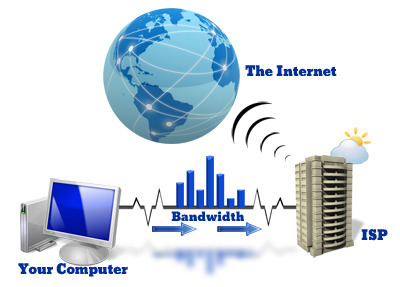Know All,What Is Internet/Net Speed | Why Is It Important?
Just think of internet speed like water pressure: it’s all about how much volume is moving in a given amount of time. (As with water pressure, it’s technically about how much volume is moving in a given amount of space, but for practical purposes, this analogy holds up.)
 |
| What is Internet Speed |
All computers connected to the internet transfer information to each other in electronic packets. A packet is simply a unit of data. Lets think of it as a drop of water. Just like more water pressure will deliver more drops of water in a shorter amount of time, a faster internet connection will deliver more electronic packets in a shorter amount of time. A volume of data transferred through a connection in a given amount of time is that connection’s internet speed.
Thus,As far as internet speed goes, you could technically stream a video by watching one or two frames at a time and then waiting for it to buffer for a few minutes, but nobody wants to do that.It means that a faster internet speed will make everything you do online a smoother experience.
Testing Your Speed
It is essential to know your internet speed and how it compares to recommendations from internet-based services, like Netflix will help you get the most of these services and more.
As speed is so vital to making your internet-dependent activities work well, you should test your internet speed regularly. Internet Speed can be easily tested by clicking the link below.
Test Your Internet Speed
Test Your Internet Speed
Also knowing your internet speed will help you find the best deal on internet service because when an Internet Service Provider advertises a promotional special, you’ll have a reference point to get notified if the speed it is offering is actually faster than what you already have getting now.
Upload Speed vs. Download Speed
Once you finish the speed test, you’ll see two numbers in the results: one is your upload speed and the other is your download speed. You should need to understand the differences between these two speeds so you can make the best decision about what kind of internet service you want to order based on the things you like to do online.
A Download speed is the speed at which information travels from a remote location on the internet to your internet-connected device. Consider for example, if you use your phone to access Facebook, your download speed would be the rate at which the information needed to load your Facebook page travels from the Facebook server to your phone.
An Upload speed is exactly the opposite. This is the speed at which information travels from your internet-connected device to a remote location on the internet. Consider an example such as Facebook, if you write a post on your timeline, the upload speed would be the rate at which the information needed to display your post to all your fb friends that required to travel from your phone to the Facebook server.
Upload Speed, Download Speed, and Your Internet Activities
Usually general consumer has download speeds much faster than upload speeds. It makes sense because consumers generally download much more information than they upload. For Streaming videos or music, reading a blog post, or scrolling through your Instagram feed are all activities with almost no upload needed once they’re initiated. These are all passive applications, not interactive applications.
In case of interactive applications, upload speeds become much more important for interactive applications. However some common interactive applications, like online gaming and video chat, are better with decent upload speeds, most consumer internet services provide enough upload speed to handle these things without many issues.
Also upload speeds are also critical in corporate settings. Functions such as sharing large files can require a lot of upload speed. Consider if you need to send an image to a client for approval, you’ll want good upload speed, especially if you have multiple people doing this same thing at the same time. Also, if you want to make High Definition(HD) videos or any other type of large file and need to upload them to a server or cloud, your upload speed will come into play.
Let us understanding the types of things you do on the internet and the difference in upload speed versus download speed will help you pick a better internet service for those activities.
If you analyze your speed test results, you may just think the higher the number, the better the speed, but the number is not enough information. Here you need to pay attention to how the speed is measured, which brings us to the next section.
Bits and Bytes
As mentioned earlier, internet speed is a measure of the rate at which information is transferred from one place on the internet to another. This measurement can be expressed in several ways, but the first step to understanding it is to understand the units of electronic information.
E-info or Electronic information is any piece of information stored or used by a computer or internet device. This tells computers what to do, what to display, and how to interact with each other. In computer, a bit is the basic unit of electronic information. In computer, a bit is expressed as either a one or a zero as part of the binary code that makes computers work.
But in most binary code, eight bits are combined in a series, each with a value of one or zero. This combined series of bits is one byte of information.
There is variation in the values of the bits in a byte determines what information that byte represents. It means one byte could represent any of 256 possible pieces of information. These bytes can then work together to create even more variety. Thus nearly all electronic information—from the display on a basic calculator to the stream of an HD blockbuster—is made up of these bits and bytes.
Bits Per Second
When any computers send information over the internet, that information is in bits or bytes. These bits or bytes take time to reach their destination. That taken time is measured in seconds. Thus, internet speeds are measured by identifying how many bits or bytes are transferred in one second, hence bits per second, or bytes per second.
As these bits and bytes are so small, the number transferred in a single second is almost always well over 1,000. There is common practice is to express those large numbers using the metric-based prefixes: kilo for 1,000, mega for 1 million, and giga for 1 billion.
Finally putting this all together, internet speeds can be measured in kilobits per second (Kbps), kilobytes per second (KBps), megabits per second (Mbps), megabytes per second (MBps), gigabits per second (Gbps), or gigabytes per second (GBps).






good
ReplyDeletethat's why we are planning to upgrade plans, looking for bet possible mobile quotations here in AU
ReplyDelete